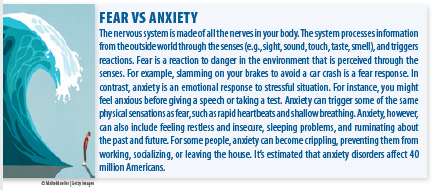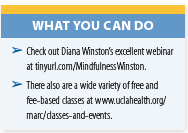This Is Your Nervous System Calling

© gilaxia | Getty Images
By practicing mindfulness, you can be the creator of calm and joy during the holidays.
The term “mind-body connection” refers to the interconnection between mental and physical health. Obvious examples include the effect of mental stress on the body: It can create a gnawing feeling in the gut and potentially trigger or exacerbate inflammatory disorders (e.g., irritable bowel syndrome, eczema). Equally apparent are what sensory experiences can do to mental states. For example, hearing the voice of a loved one can lift your mood, but hearing persistent loud hammering can trigger anger.
There also are messages from our nervous system that may fall below our immediate radar screen. They, too, deserve attention because when we decode them, we may be able to readjust the quality of our lives for the better.
Inner Sensations /Mental Assumptions
In a recent online class, Matthew Brensilver, PhD, lecturer at UCLA’s Mindful Awareness Research Center (MARC), said, “Making your nervous system your ally can be quite enlightening.” Like many MARC presenters, Brensilver blends mindfulness (a type of meditation) with a dose of cognitive therapy. During his workshop titled “Maturing our Stories, Relinquishing Our Stories,” he emphasized the need to question our opinions about experiences and to let go of storylines. Easier said than done, of course. But that’s where consistent meditation and mindfulness practices are beneficial.

The first step, according to Brensilver, is to hear your nervous system. Messages can come in the form of food cravings when you’re not hungry, the desire to just walk out of a room due to a disturbing conversation, or to lash out when a view that opposes yours is voiced. Through the years, we develop habits of reactivity that become embedded, unconscious, and unhelpful. The practice of mindfulness can help us become aware of our habits and decide which to nurture and which to phase out.
During mindfulness meditation, the first step is to settle the jumpiness in body and mind. What works for many people is to take several deep breaths and let the mental chatter subside (e.g., evaluating what you did today, mulling memories, or those constant to-do lists). The settling can take several minutes. Once there’s more inner calm, Brensilver suggests focusing on the following:
Practice patience. Give up trying to make things happen or to speed up nature. Instead, nurture tranquility. This does not mean that everything will be calm or perfect. Rather, the idea is to focus your mind (on breathing, for example) and thereby nudge the mind toward tranquility and away from the constant need to do or think.
Let go. To cling is to suffer and complicate life, according to Buddhist philosophy. It also highlights what we’re willing to give up our peace for, says Brensilver. Try to let go of those mental dramas.
Look for the good. Learn to identify the good that’s already here. It doesn’t need to be cultivated or developed. Notice and rest in what is already good.
Care verse worry. How can you care for your life without trying to control every detail? It helps to understand the difference between fear and anxiety.
Holiday Mindfuless
That last point is an important one, especially as concerns about the holidays can take center stage. Worrying can place us in a state of anxiety where false fear alarms trigger a state of hyperactivity, making us fret about creating a perfect menu that meets everyone’s food preferences, how to keep argumentative relatives apart, or just getting the house ready. Or we might worry about where we’re going to spend the holidays or with whom.
Emotions can be overwhelming at this time. But there are antidotes that can have immediate benefits. Pause to check in with your thoughts and feelings. Then practice one or more of the aforementioned techniques. The more you practice, the more resilient you can become. It takes patience and persistence, but the rewards can be huge.
Your Brain on Mindfulness
 In her webinar, Mindfulness for Stress Reduction and Wellbeing Diana Winston, director of mindfulness education at MARC, shares scientific evidence revealing the positive impact of practicing mindfulness.
In her webinar, Mindfulness for Stress Reduction and Wellbeing Diana Winston, director of mindfulness education at MARC, shares scientific evidence revealing the positive impact of practicing mindfulness.
For example, a UCLA randomized controlled study showed that eight weeks of mindfulness-based stress reduction (MBSR) can reduce loneliness and the loneliness-related pro-inflammatory gene expression among older adults. A University of California study showed that college students who practiced mindfulness for six weeks boosted their attention skills and their graduate record exam (GRE) score by 16 percentile points. A 2007 study showed that advanced meditators had thicker prefrontal cortex tissue and more brain cell activity compared to nonmediators.
The prefrontal cortex is the seat of executive function. It is responsible for regulating impulse control and managing emotions. You don’t have to be an expert longtime meditator to gain benefits. A 2011 study showed that even novice meditators who practiced about 27 minutes a day experienced changes in gray matter thickness in various parts of the brain involving learning and memory, attention, and stress response.
Under the Influence of Food and Drink
Emotions can easily be stimulated by what we eat and drink. For example, too much alcohol can trigger melancholy or anger. Overeating can lead to lethargy and numbing out. Both are very easy to succumb to during the holiday season, especially if someone at the dinner table makes a negative or provocative remark.
Rather than getting sucked in to an argument or overconsuming, mindfulness suggests that the interpretation of the remark is what causes your suffering. By pausing and reflecting, we have the option to choose between mind states that create suffering and those that help to instill peace. According to Brensilver, we are much more suggestable than we tend to believe. The risk is if we’re not aware of our inner life, we’re easily manipulated. Next time you start ruminating or stewing in anger, ask youself if it’s worth giving up your peace for those mental dramas.

The post This Is Your Nervous System Calling appeared first on University Health News.
Read Original Article: This Is Your Nervous System Calling »

